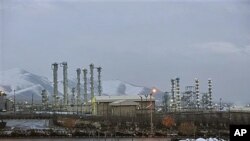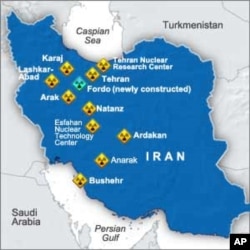World powers expressed concern on Thursday about Iran’s nuclear intentions after the country said it plans to triple its output of higher-grade uranium. Our reporter speaks to analysts about the stand-off between Iran and a number of world powers and how a resolution might be found.
Iran’s nuclear drive is causing “deep concern” to a number of world powers, they said in a statement on Thursday.
During a meeting in Vienna held by the International Atomic Energy Agency, the United States, China, Russia, Britain, France and Germany said in a joint statement that Iran must provide more information about its nuclear intentions.
Concern factor
That statement followed an announcement from Iran that it will triple its output of 20 percent-enriched uranium. World powers fear Iran is developing a nuclear weapons program.
Mark Fitzpatrick is director of the Non-Proliferation and Disarmament Program at the International Institute for Strategic Studies, a global security research group based in Britain.
He told VOA that Iran’s Wednesday announcement is problematic. “I think Iran's uranium enrichment has been worrying for some years and the latest development about Iran's announcement that it will be increasing the production of 20 percent-enriched uranium, for which it has no civilian use and which is very close to weapons-usable equipment, is more worrying than ever,” said Fitzpatrick.
Iran says the aim of its enrichment program is energy security. Enriched at a low level, below 5 percent, uranium can be used to fuel a reactor to generate electricity.
Iran says it needs to produce uranium at the higher level of 20 percent purity to make fuel for a medical research reactor for the treatment of cancer.
But if uranium is further enriched to 90 percent purity it can be used to develop a nuclear weapon - and it’s that which has world powers wary.
The U.N. Security Council has repeatedly told Iran to suspend its uranium enrichment until the international community can verify that it won’t be used for military ends. Fitzpatrick says that verification hasn’t been possible.
"The IAEA has not been able to verify, because of Iran's refusal to cooperate fully with the investigation, its refusal to allow inspectors full access, its refusal to provide advanced design information about its facilities, which is required by its safeguards agreements. When a country violates its IAEA obligations in this way, it's the role of the U.N. Security Council to enforce the obligations," he said.
'Possible military dimension'
In a recent report, the head of the International Atomic Energy Agency said there may be a “possible military dimension” to Iran’s nuclear program. Iran’s ambassador to the IAEA said the report was neither balanced nor factual.
No new measures were planned at the meeting in Vienna but earlier this week, U.S. President Barack Obama said more sanctions may be slapped on Iran for its nuclear program.
Iran is already under four rounds of U.N. sanctions and it says no offer could halt its enrichment of uranium.
Stalemate
Fitzpatrick says both sides of the divide seem set for a stalemate. "I'm pessimistic that there will be a resolution. I actually foresee a kind of long, cold war-type situation where Iran is under increasing sanctions, it is increasingly isolated, its people will have to bear the burden of their leaders' decisions," he said.
A U.S. envoy described Iran’s Wednesday announcement on nuclear enrichment as a “brazen example of its deepening non-compliance.”
But Richard Dalton, who was Britain’s ambassador to Iran from 2003 until 2006, tells another story.
Speaking to VOA, he says Iran started producing uranium at 20 percent purity early last year and, because of international sanctions, Iran does not have access to the kind of materials needed to launch a “fully fledged” nuclear enrichment program.
He says officials on both side of the divide are trying to raise the stakes over the nuclear issue. In Iran, he says, the leadership gains public favor by appearing defiant.
What next?
The U.S. and other world powers, he says, want justification to take action. "They're always trying to build a case for further international pressure because they are stuck with a sanctions policy, which is not working. And the only way, they believe, of making it work better is to put more sanctions on them [Iran]. And that requires a heightening of the threat every time there is a new announcement," said Dalton.
But Dalton says more sanctions will not work. He says the policy of insisting that Iran suspend its nuclear enrichment program has failed and a new, more flexible approach is needed.
"We have an effective instrument in the International Atomic Energy Agency. In order to ensure that all Iranian nuclear activities are peaceful in intent, we have to ensure an appropriate level of limitations and of scrutiny and of monitoring by the International Atomic Energy Agency of everything that Iran does. That should now be the objective of the international negotiations, which has been deadlocked for far too long for the safety of the Middle East and for the pursuit of the countries, including mine, involved in the negotiations," said Dalton.
In its announcement Wednesday, Iran said the high-grade uranium production will be produced at Fordo, a plant around 150 kilometers from Tehran.
The existence of Fordo was long kept a secret until it was identified by Western intelligence in September 2009.





